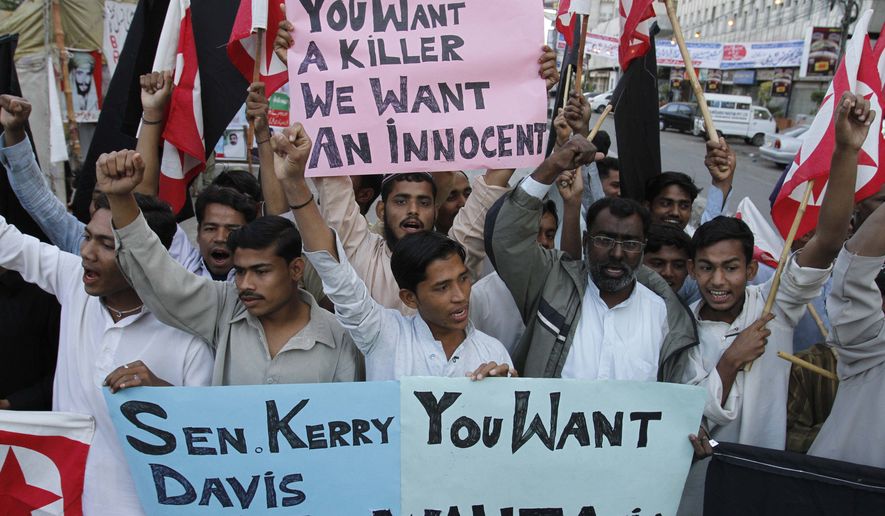LAHORE, Pakistan (AP) — A Pakistani court delayed a hearing Thursday on whether a U.S. Embassy worker detained for fatally shooting two Pakistani men has diplomatic immunity. The decision came a day after a visiting U.S. senator pressed for a quick resolution to avert a meltdown in the countries’ relations.
The chief justice of the Lahore High Court agreed to a government request for a three-week delay to allow it more time to prepare its position on the issue of immunity. The hearing was rescheduled for March 14.
The case is straining Washington’s already troubled relationship with Pakistan, a key partner in the war in Afghanistan and in battling al Qaeda and other Islamic militant networks.
The United States says that Raymond Davis shot two armed Pakistani men in self-defense as they tried to rob him and that his detention is illegal under international agreements covering diplomats.
Pakistani leaders, fearful of stoking more outrage in a public already rife with anti-U.S. sentiment, have said the matter is up to the courts to decide.
Pakistan’s federal government also will submit an opinion on the matter and asked the court for more time to prepare, Deputy Attorney General Naveed Inayat Malik said, without elaborating.
It was not immediately clear why the government needed the extra time. Government officials previously said that they were ready to issue their findings to the court at Thursday’s hearing.
Chief Justice Ijaz Chaudhry said he could not hand down a decision before getting the government statement.
“How can I issue any order when I do not have anything from the federal government regarding his diplomatic immunity?” Justice Chaudhry asked. He did not say how long he expected a ruling to take after receiving the needed statements.
Mr. Davis has been held in a Pakistani jail since his arrest in Lahore, eastern Punjab province’s main city, immediately after the Jan. 27 shootings. His name has also been put on a list barring him from leaving Pakistan, Mr. Malik said.
Mr. Davis’ case is working its way through Pakistan’s judicial system on several tracks. Police say they plan to ask that Mr. Davis be charged with murder.
Also Thursday, a judge in a separate court extended Mr. Davis’ judicial custody for 14 days in a case dealing with his possession of a gun. A senior U.S. official has said the Americans had authorized Mr. Davis to have a gun, but that it was a “gray area” whether Pakistan’s government allowed it.
On Wednesday, U.S. Sen. John Kerry said he was hopeful that Washington and Islamabad can make progress “in the next few days” toward resolving the dispute. Mr. Kerry held two days of meetings with senior Pakistani government officials and opposition powerbrokers.
“Now everybody has to work in good will to make the words mean something,” Mr. Kerry told reporters before boarding a plane in the Pakistani capital. “They will only mean something with actions that result in an appropriate and judicious outcome being accomplished. I think that will be done.”
Pakistan’s government has appeared divided on how to handle the Davis case. It is under pressure from U.S. officials to release him, while thousands of Pakistanis have called for him to be tried on charges of murder.
Much of the confusion over Mr. Davis’ status lies in his background.
The United States says Mr. Davis was part of the embassy’s “administrative and technical staff,” which means he might have been involved with security, but Pakistani media have focused on him being a former Special Forces soldier who runs an American “protective services” company with his wife.
Although the United States says he’s an embassy employee, he apparently had been attached for a while to the consulate in Lahore, further adding to the confusion about his status since consulate employees do not always get the same level of diplomatic protection as embassy staffers.
On Thursday, the top legal official for Punjab province maintained that Mr. Davis did not qualify for immunity because of his connection to the Lahore consulate. Though Mr. Davis was holding a diplomatic passport, “it does not mean that he enjoys immunity from criminal prosecution,” Punjab Advocate General Khawaja Haris said.
The AP also obtained a photocopy of an ID and a salary document that Mr. Davis apparently gave Pakistani authorities showing that he was scheduled to be paid for “overseas protective sec. svcs.” The ID card identifies him as a Defense Department contractor.
Associated Press writer Munir Ahmed contributed to this report from Islamabad.




Please read our comment policy before commenting.